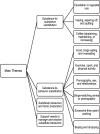Narcotics Anonymous attendees' perceptions and experiences of substitute behaviors in the Western Cape, South Africa
- PMID: 37408038
- PMCID: PMC10324242
- DOI: 10.1186/s13011-023-00552-z
Narcotics Anonymous attendees' perceptions and experiences of substitute behaviors in the Western Cape, South Africa
Abstract
Background: Much remains unknown about the dynamics of substitute behaviors during addiction recovery among persons attending recovery support groups. Insight into the nature, motives for, and course of substitute behaviors could help to shape recovery support and harm reduction services.
Methods: Twenty-three semi-structured in-depth interviews (n = 14 males and n = 9 females) were conducted with a convenience sample of Narcotics Anonymous attendees from a number of groups in the Western Cape, South Africa. Participants ranged in age from 22-55 years (M = 39.3, SD = 9.35).
Results: Thematic analysis yielded four themes: (i) substance-to-substance substitution; (ii) substance-to-behavior substitution; (iii) substitute behaviors and harm (reduction) and (iv) support needs to manage and resolve substitute behaviors. According to the study, participants' substitute behaviors developed across recovery stages; were temporary or long-term replacements for substance use disorders and were engaged for distraction, isolation from others, calming, assuaging boredom, keeping occupied, filling a perceived experiential void, modifying mood and to self-medicate. While substitutes were utilized for harm reduction or relapse prevention, the potential for ostensibly healthy behaviors to threaten recovery and lead to relapse was also recognized.
Conclusions: Self-monitoring, ongoing vigilance, and awareness of when substitutes become genuine addictions are critical for timely, suitable interventions.
Keywords: Behavioral addictions; Recovery support groups; Substance use; Substitute behaviors.
© 2023. The Author(s).
Conflict of interest statement
The authors declare no competing interests.
Figures
Similar articles
-
Substitute Behaviors following Residential Substance Use Treatment in the Western Cape, South Africa.Int J Environ Res Public Health. 2021 Dec 5;18(23):12815. doi: 10.3390/ijerph182312815. Int J Environ Res Public Health. 2021. PMID: 34886541 Free PMC article.
-
Substitute Addictions in Persons with Substance Use Disorders: A Scoping Review.Subst Use Misuse. 2021;56(5):683-696. doi: 10.1080/10826084.2021.1892136. Epub 2021 Mar 21. Subst Use Misuse. 2021. PMID: 33749518
-
Dual recovery among people with serious mental illnesses and substance problems: a qualitative analysis.J Dual Diagn. 2015;11(1):33-41. doi: 10.1080/15504263.2014.975004. Epub 2014 Dec 9. J Dual Diagn. 2015. PMID: 25491440 Free PMC article.
-
One size doesn't fit all: a thematic analysis of interviews with people who have stopped participating in Narcotics Anonymous in Norway.Addict Sci Clin Pract. 2020 May 24;15(1):18. doi: 10.1186/s13722-020-00191-w. Addict Sci Clin Pract. 2020. PMID: 32448354 Free PMC article.
-
Substance misuse trends in South Africa.Hum Psychopharmacol. 2012 May;27(3):338-41. doi: 10.1002/hup.2228. Hum Psychopharmacol. 2012. PMID: 22585594 Review.
References
-
- Narcotics Anonymous World Services. https://www.northwestna.org/for-professionals (2023). Accessed on 22 April 2023.
-
- Sussman S. Substance and behavioral addictions: Concepts, causes, and cures. 1st ed. Cambridge University Press; 2017.
-
- White W, Kurtz E. The varieties of recovery experience: A primer for addiction treatment professionals and recovery advocates. Int J Self Help and Self Care. 2005;3(1–2):21–61. doi: 10.2190/911R-MTQ5-VJ1H-75CU. - DOI
-
- Day E, Kirberg S, Metrebian N. Affiliation to Alcoholics Anonymous or Narcotics Anonymous among patients attending an English specialist addiction service. DAT. 2019;19(4):257–269. doi: 10.1108/DAT-05-2019-0017. - DOI
Publication types
MeSH terms
Substances
LinkOut - more resources
Full Text Sources
Medical


